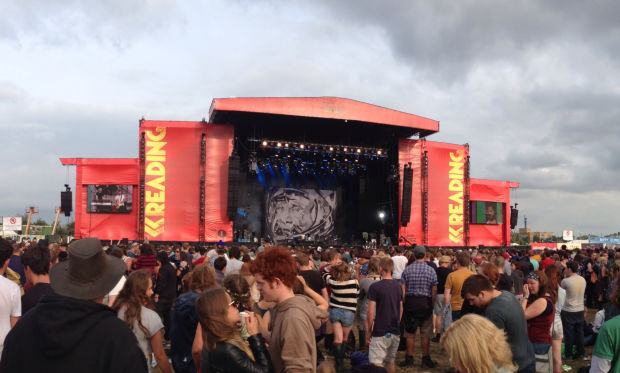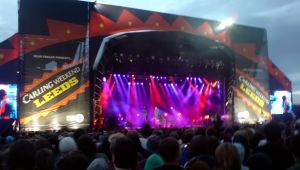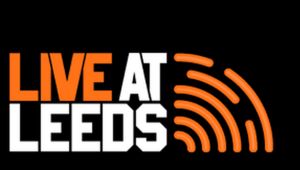Back when I first attended Leeds Festival, around the time of being fifteen or sixteen, it was a much different event. It was smaller, much more concentrated in rock, punk and indie, and attracted a certain demographic of teenagers. It was only as I got older that I noticed a year-on-year change in the experience, and who I was sharing it with.
Looking back, I’m not entirely sure I saw more than a handful of other non-white faces when I started attending the festival, and it made a certain degree of sense given the acts playing. In 2010 for example, one of the first years I went, I counted less than five predominantly non-white acts on the main festival poster. At the time, that didn’t do so much as even raise an eyebrow, as my expectations of the festival centred more around warm beer and white men with guitars than a professional curiosity regarding the racial diversity of the event.
Just five years down the line, the festival has grown and expanded for the better, attracting a much wider demographic of attendees. While the staples of rock, punk and indie are still the mainstay of the festival, specialised areas for dance, hip hop and grime are increasingly popular. Back in 2010, when only a much more mainstream pop-sounding Dizzee Rascal and a very raw Giggs were the grime acts available, it’s easy to see why many stayed away.
This year, however, hip hop and grime is being represented well right the way across the festival. Kendrick Lamar has a penultimate slot booked on the main stage, Run The Jewels are high up the bill in the biggest tent, whilst acts like Boy Better Know have headline arrangements on the smaller stages. Many who simply won’t have shown any interest five years ago now have a representative festival to attend, and it’s not about to change.
To find out more about the growth of other genres at Reading and Leeds, we spoke to the head booker of the festival, Jon Mac, about the thinking behind it all.
Sabotage Times: Jon, the festival has grown quite a bit over the past few years, and there’s now much more hip hop and grime on show than there ever has been before. What was the thinking behind that?
Jon Mac: Firstly, we’ve only added stages, we’ve not taken anything away. There’s even more rock and punk than there used to be too. We’ve increased the amount of artists playing and the number of stages they’re playing across. The 1xtra stage, which we did for the first time in 2013, was a big step, and an important one. hip hop is as mainstream now as its ever been, and we felt we had to recognise that.
ST: The inclusion of hip hop at the festival actually feels quite natural and well done, rather than feeling at all forced. How is that?
JM: Hip hop has a long history at the festival, we’ve had acts like Public Enemy high up on the bill in the mid 90s. This festival is about authenticity and music with a harder edge, and hip hip feeds in to that. Personally I’ve got a hip hop background, and have worked on hip hop and dance events plenty in the past, so we’re very confident in who we’re supporting.
ST: You’ve had acts like Eminem and Macklemore at the festival in the past, but they’re a little more accessible than Kendrick Lamar is, who’s rightfully high up the bill on the main stage this year despite having some choice words to say on some extremely sensitive matters. Is it a risky booking?
JM: Kendrick is unique. He’s cool, credible and he’s got a bit of political voice, and that’s in keeping with the history of the festival. We’ve always cherished the edge we have, with acts like Rage Against The Machine in 2008 being one of the biggest shows we’ve ever had. It’s important you have these people come and play the festival, and we want to put them in front of as many people as possible.
ST: Is the growth in hip hop and grime at the festival an open attempt to sell more tickets to a wider demographics?
JM: We sell more tickets now than we did in 2009, but the decisions made in terms of line-up was more about providing people with a better variety than trying to attract a particular type of audience. It’s more about preserving our values as a festival and we could see that there was going to be a sea-change in hip hop, and we wanted to create a vehicle for that. If that’s meant that we’ve attracted new people and people from different background, then that’s really positive.
ST: The festival has grown an awful lot in the past few years in both size and volume of performers. Will you continue to do so in the years to come?
JM: We’re going to continue doing what we do, and if that appeals to people, than we’ll get bigger. We’re a pure music festival, which is different to a lot of other events out there. As long as that’s what people want, then we’ll continue to grow, and continue to be an important part of the festival calendar.
Reading and Leeds Festival runs this weekend, from the 28th-30th of August 2015. For more information about tickets, click here for Reading, or here for Leeds.
Raj Bains is on Twitter - you can find him over @BainsXIII




